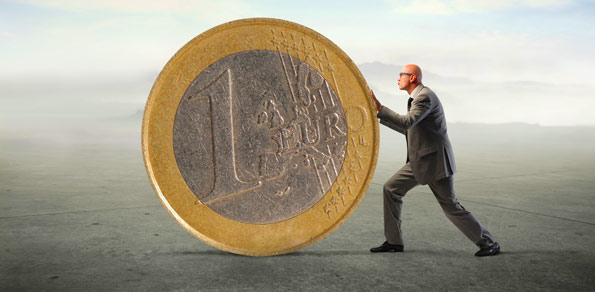“The Euro Will Outlast Us All” – Jean-Claude Juncker
Jean-Claude Juncker, who heads the Euro group of finance ministers, when interviewed on German radio stated that “the euro would outlast us all”, he’s confident that Greece will remain in the single currency. He’s also adamant that Europe’s costs would escalate if Greece were to quit the euro.
[quote]If we force them out we would still be forced to support Greece and would have to invest unimaginable sums. That would be at least as expensive as the virtual costs of the aid credits up to now.[/quote]
Today’s strikes in Greece will cause widespread disruption in a country used to regular industrial action since the financial crisis began. Demonstrations will take place in Athens, raising fears that tensions could rise. Many previous protests descended into clashes between riot police and masked protestors. The strike will force many schools to close and disrupt work at local level at government offices. Hospitals will be forced to operate with limited staff. Transport links will be disrupted, bus, rail and metro services in Athens partially suspended.
Greece’s prime minister and the leaders of the country’s main political parties are set to resume talks today on new austerity measures demanded by the EU in return for a second bailout. The deal needs to be approved by February 15 if the money is to be available in time to meet a March 20 bond redemption.
Greek Prime Minister Lucas Papademos negotiated through most of the night with Greece’s European Union and IMF lenders, ending at 4 a.m. (0200 GMT) when the 24-hour strike began, closing ports, tourist sites and disrupting public transport. Papademos, a technocrat parachuted in to lead the Greek government late last year, must persuade leaders of the three parties in the Greek coalition government to accept the EU/IMF conditions for the 130-billion-euro rescue.
Greece has yet to identify spending cut measures worth 600 million euros this year, out of a total austerity package of about 3.3 billion euros. The troika is demanding that private firms’ labor costs be cut by a fifth. This would be achieved by reducing the minimum wage by up to twenty percent, dragging the entire wage structure down and by cutting holiday bonuses and scrapping some industry-wide wage bargaining agreements.
Private sector workers currently receive holiday bonuses amounting to two months’ pay in total, such benefits have already been cut for public workers. The troika wants top-up, supplementary pensions to be cut by 15 percent on average to make the pension system financially viable.
Market Overview
The euro has strengthened in the morning session as Greece holds negotiations in order to secure its rescue funds. The Australian dollar jumped to a six-month high after the central bank kept interest rates unchanged. The MSCI All-Country World Index increased 0.2 percent as of 8:00 a.m. in London. Standard & Poor’s 500 Index futures added 0.2 percent, while the euro strengthened 0.1 percent. The Australian dollar climbed 0.8 percent and the nation’s 10-year bond yield rose 10 basis points to 3.93 percent. The Shanghai Composite Index tumbled 1.7 percent, the most in three weeks, and copper dropped amid concerns that economic growth is slowing therefore the demand for the commodity will taper off. Copper for delivery in three months declined 0.2 percent to $8,480.25 a metric ton on the London Metal Exchange. Oil was little changed at $96.92 a barrel.
In the fourth quarter, Japan sold a total of 1.02 trillion yen ($13 billion) versus the dollar in markets on the first four days of November in addition to 8.07 trillion-yen sale on Oct. 31, a report from the Ministry of Finance showed. Japan’s currency climbed to a post-World War II high of 75.35 per dollar on Oct. 31.
Market snapshot as of 10:10 am GMT (UK time)
The principal Asian and Pacific markets fell in the overnight early morning session. The Nikkei closed down 0.13%, the Hang Seng closed down 0.05% and the CSI closed down 1.85% this was the biggest fall in the Shanghai composite index in over three weeks. The ASX 200 closed down 0.51%. European bourse indices are noticeably nervy in the European morning session, a natural response to the perpetual Greek ‘issues’. The STOXX 50 is down 0.41%, the FTSE is down 0.30%, the CAC is down 0.37% and the DAX is down 0.61%. The Athens main index is up 1.83%. The SPX equity index future is currently priced up 0.10%, ICE Brent crude is down $0.3 a barrel whilst Comex gold is up $0.30 per ounce.
Forex Spot-Lite
The yen fell 0.1 percent to 76.64 per dollar, weakening versus all of its 16 major counterparts. Japanese Finance Minister Jun Azumi said he won’t rule out any options to curb the currency’s appreciation.
Investors will be vigilant with regards to the press conference of the SNB interim President T.Jordan on Tuesday midday/afternoon to gauge any clues as to direction of the next steps regarding the bank’s monetary policy involving the CHF 1.20 peg against the single currency. The EUR/CHF pair has been printing fresh session highs in the 1.2075 zone.





